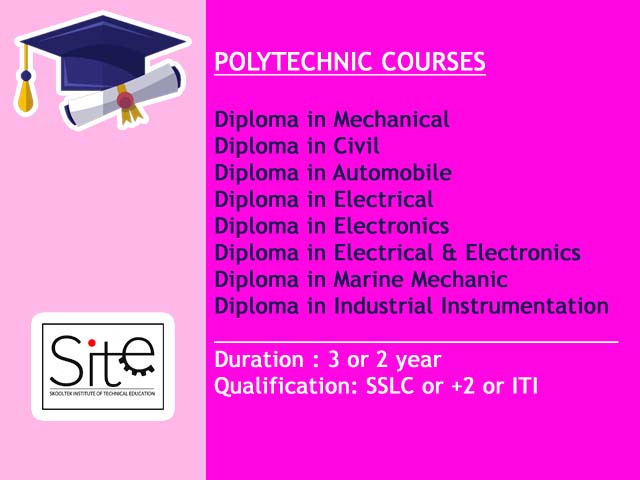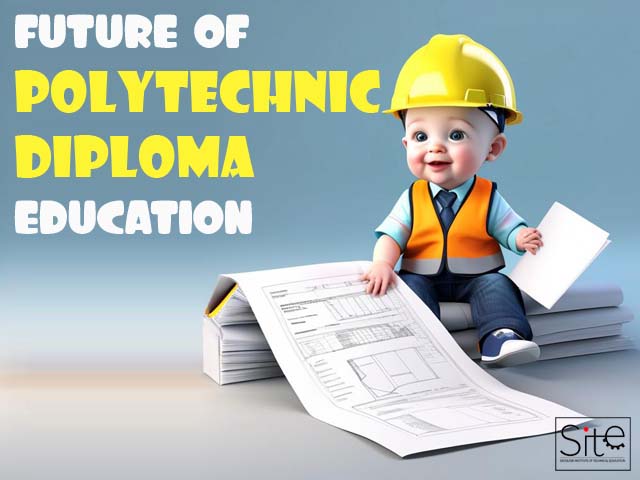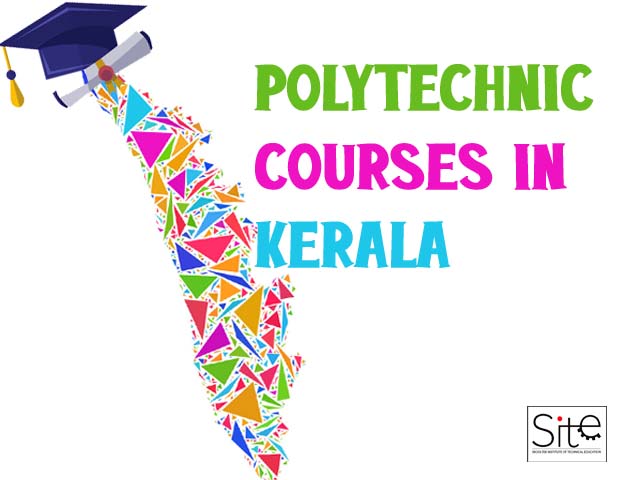- Have any questions?
- 9544233633
- info@skooltek.in
Opportunities for Polytechnic Pass out Students

The Importance of a Polytechnic Diploma in Engineering
April 25, 2024
Career Opportunities of Polytechnic Diploma
April 29, 2024Opportunities for Polytechnic Pass out Students
- Diploma in Automobile Course
- Diploma in Civil Course
- Diploma in Electrical & Electronics Course
- Diploma in Electrical Course
- Diploma in Electronics Course
- Diploma in Industrial Instrumentation Course
- Diploma in Marine Mechanic Course
- Diploma in Mechanical Course
- Duration : 3 or 2 year
- poly diploma course admission open 2024 batch
- poly diploma lateral entry admission open 2024 batch
- Qualification: SSLC or +2 or ITI

Polytechnic education is a technical education where students are taught to apply their technical knowledge and skills in practical situations. It provides an alternative to educational attainment in a situation where higher education becomes increasingly internationalized. It offers more flexibility and cost savings compared to other forms of education. Polytechnic diploma holders are in demand by industry as they are equipped with the latest skills and knowledge and are considered effective in making significant contributions to organizations. With the lack of comprehensive information about the opportunities for Polytechnic diploma pass out students with their qualification, partial qualification or credit exemption to further their education, it may result in them being unsure of their job prospects. This can be a great cause of anxiety for the students and their parents. It also makes it hard for them to make the next move after they have completed their studies at the Polytechnics diploma. This essay aims to provide an overview of the various opportunities that are available to Polytechnic diploma pass out students. Providing a comprehensive understanding of the benefits available for furthering their education, the different entry routes available for students, credit exemptions, some common problems faced, and case scenarios, students could better understand the routes available to them, in deciding what may be best to suit their needs and which can provide a better career path for them in the long run.For more details and poly diploma admission please click here https://www.skooltek.in/technical-diploma-courses/

Polytechnic Education
This system of education evolved in India in the last century mainly as an outcome of recommendations of several committees that had been appointed keeping in view the need for a more practical-oriented system that would bridge the gap between the academics of the university and employability. The first polytechnic was established in 1960. The main idea was to create a workforce that was more of a technician than a techie. They were supposed to be the wheels of progress in an industrialized India. With a strong fundamental base in technical and soft skills, they are like the raw material ready to be shaped in any form, thus making them a very versatile group of workers. The diploma courses run by these polytechnics are of 3 or 2 years duration in various fields, after the 10th standard (SSLC). These fields could vary from Civil, Mechanical, Electrical, Electronics, Automobile, Computer, IT, etc. to more unconventional ones such as Instrumentation, Production, Packaging Tech, Plastic Tech, Mining, Marine and Control, Metallurgical, etc. Now, technical education in India has grown rapidly during the last decade and considering that India is an aspiring superpower, demand for a diploma holder has grown by a mile. This is because they are available at a much cheaper cost and come out to be an efficient employee for the company at a lower position than an engineer, trying to do the same job at a much higher cost. With the boom of the software industry recently, diploma holders in computer science have struck a gold mine! But the same cannot be said for diploma holders in other fields, and it would be foolish to expect them to go and search their field of work in a software company. Suitable or not, the most grumbling fact common to all diploma holders is the promotion of an engineer in a technical field, where they expect to be up to an appreciable extent handled across with loads of politics! For more details and poly diploma admission please click here https://www.skooltek.in/technical-diploma-courses/

poly diploma course admission open 2024 batch,
poly diploma lateral entry admission open 2024 batch,
Diploma in Marine Mechanic Course,
Diploma in Industrial Instrumentation Course,
Diploma in Mechanical Course,
Diploma in Civil Course,
Diploma in Automobile Course,
Diploma in Electrical Course,
Diploma in Electronics Course,
Diploma in Electrical & Electronics Course,
Duration : 3 or 2 year,
Qualification: SSLC or +2 or ITI,




